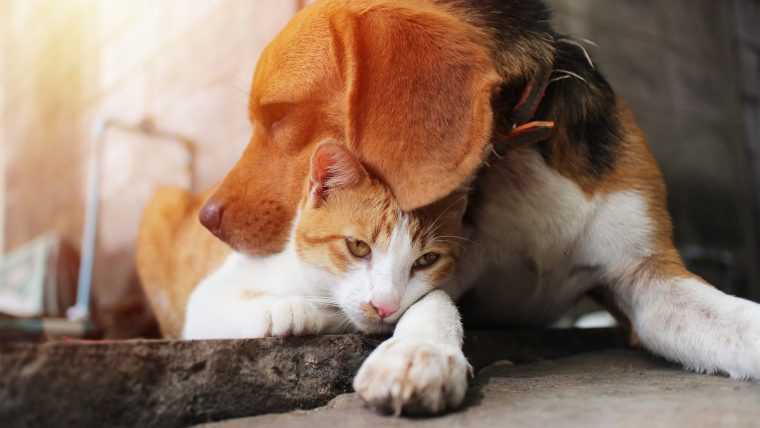
Delaware Legislation Enhances Protections for Companion Animals in Families
By Nicole Pallotta, PhD, Senior Policy Program Manager
Contents
Animal Law and Family Law
Delaware’s new legislation recognizes that companion animals are left vulnerable when the law fails to clearly differentiate them, as sentient beings, from other property. These laws are important because they recognize that companion animals need distinct protections due to their special place in the family — both as beloved family members and as targets of abuse.
As reported by WHYY, “the bills grew out of an Animal Welfare and Family Law seminar organized last year by Family Court Judge Jennifer B. Ranji, who once headed the Delaware agency that conducts child abuse and neglect investigations.” The bills, which were introduced in March 2023, enjoyed widespread support and moved quickly through the legislature. The Animal Legal Defense Fund assisted with drafting and provided research support and guidance as the bills progressed.1

Considering Companion Animals’ Interests in Custody Disputes
House Bill 95 requires courts to consider companion animals’ wellbeing or care when determining “custody”2 in cases of divorce. With passage of this law, Delaware becomes the seventh state to mandate that companion animals be treated differently from other types of marital property in divorce and separation proceedings.
Even in the absence of legislation expressly empowering or requiring them to do so, judges typically have discretion to consider animals’ interests in cases of divorce. However, “pet custody” laws resolve ambiguity in the law by ensuring animals, while legally classified as property, are treated differently from furniture, cars, and inanimate marital assets — and that decisions regarding their placement are considered within a juridical framework that recognizes their interests as sentient beings.
Including Companion Animals in Domestic Violence Protection Orders
Recognizing that companion animals are also affected by domestic violence — both as primary victims and as subjects of threats to coerce a human victim who has a bond with the animal — Senate Bill 70 empowers judges to include companion animals in domestic violence protection orders. Delaware joins a growing list of states that recognize animals, as vulnerable family members, are frequently targeted by abusers and used to manipulate and control a human victim, who may delay leaving the situation out of fear a beloved animal companion will be harmed or killed as retaliation — a fear that is sadly often justified.3
Reporting Suspected Animal Cruelty in Child Abuse Cases
While companion animals are often used as tools of psychological manipulation and targets of retaliation in domestic violence situations, they can also be victims of abuse that mirrors maltreatment of children in the home4. Additionally, witnessing animal cruelty is itself a form of psychological trauma and abuse for children5. Recognizing this connection, Senate Bill 71 requires cross-reporting of suspected animal cruelty in child abuse and neglect cases. Specifically:
This Act requires law-enforcement agencies, the Department of Services for Children, Youth and Their Families, and the Department of Justice to report suspected animal cruelty to the Office of Animal Welfare that is discovered while performing their responsibilities in child welfare cases.
The new law also provides immunity to people who report suspected animal cruelty in good faith.
Conclusion
Companion animals occupy overlapping statuses in society as both legal property and family members. Like human children, they lack power in the family hierarchy, leaving them at risk for abuse. Unlike human children, their legal status as property creates ambiguity in the law when it fails to clearly distinguish them from inanimate objects. Delaware’s new legislation aims to close gaps in key areas of family law that have previously left companion animals vulnerable by tacitly acknowledging their status as sentient beings in multispecies families.

Further Reading
- Barrish, Cris. “Family pets could soon get special treatment in Delaware divorce settlements under new bill.” WHYY. May 3, 2023.
- Pallotta, Nicole R. “Chattel or Child: The Liminal Status of Companion Animals in Society and Law.” Social Sciences. May 23, 2019.
- ‘The Link’ Between Cruelty to Animals and Violence Toward Humans. Animal Legal Defense Fund.
- Laws that Include Animals in Protection Orders. Animal Legal Defense Fund.
- Laws in Favor of Reporting of Animal Cruelty. Animal Legal Defense Fund.
- Pallotta, Nicole. “Alaska Legislature Becomes First to Require Consideration of Animals’ Interests in Custody Cases.” Animal Legal Defense Fund. January 20, 2017.
References
- See the Animal Legal Defense Fund’s collection of model animal protection laws, which includes provisions for reporting animal cruelty and including animals in protection orders: https://aldf.org/article/model-animal-protection-laws/
- Since companion animals are defined as property under the law, these cases are legally about “ownership.” In addition, custody agreements are distinct in that they can later be reopened and revised if new circumstances arise. Most family courts would be averse to expanding this type of custody agreement to include companion animals because it increases litigation and court costs — as opposed to determining ownership, which typically happens only once.
- See: Hardesty, J. L. et al. 2013. “Coercive control and abused women’s decisions about their pets when seeking shelter.” Journal of Interpersonal Violence 28: 2617–39; Ascione, F. R., et al. 2007. “Battered pets and domestic violence: Animal abuse reported by women experiencing intimate violence and by non-abused women.” Violence Against Women 13: 354–73.
- Delaware does not yet have laws requiring cross-reporting for situations of suspected abuse in elder care or veterinary situations.
- See: McDonald, S. E. et al. 2015. “Children’s Experiences of Companion Animal Maltreatment in Households Characterized by Intimate Partner Violence.” Child Abuse and Neglect 50:116-127; and Ladny, R. T. and L. Meyer. 2019. “Traumatized Witnesses: Review of Childhood Exposure to Animal Cruelty.” Journal of Child & Adolescent Trauma 3(4):527–537.
Sign Up!
Join the Animal Legal Defense Fund's email list to stay up to date on lawsuits, legislation, and regulations affecting animals.
Focus Area
How We Work
Related
-
Madrid Court Awards Joint Custody of a Dog in a Pioneering Ruling
In a pioneering ruling issued in October 2021, a Madrid court awarded joint custody of a dog, explicitly recognizing the emotional bond between the plaintiff and the animal.April 5, 2022 Animal Law Update -
Alaska Legislature Becomes First to Require Consideration of Animals’ Interests in Custody Cases
With the adoption of an amendment to its divorce law, Alaska has become the first state to empower judges to take into account the “well-being of the animal” in custody disputes involving nonhuman family members.January 20, 2017 Animal Law Update -
Ecuador’s Constitutional Court Rules Wild Animals Are Subjects of Legal Rights Under the Rights of Nature
In January 2022, the Constitutional Court of Ecuador issued a landmark ruling that individual wild animals are subjects of legal rights under Ecuador’s “rights of nature” constitutional provision. The case involved a woolly monkey who was taken from the wild as a baby and kept unlawfully in a private home for 18 years.January 4, 2023 Animal Law Update




